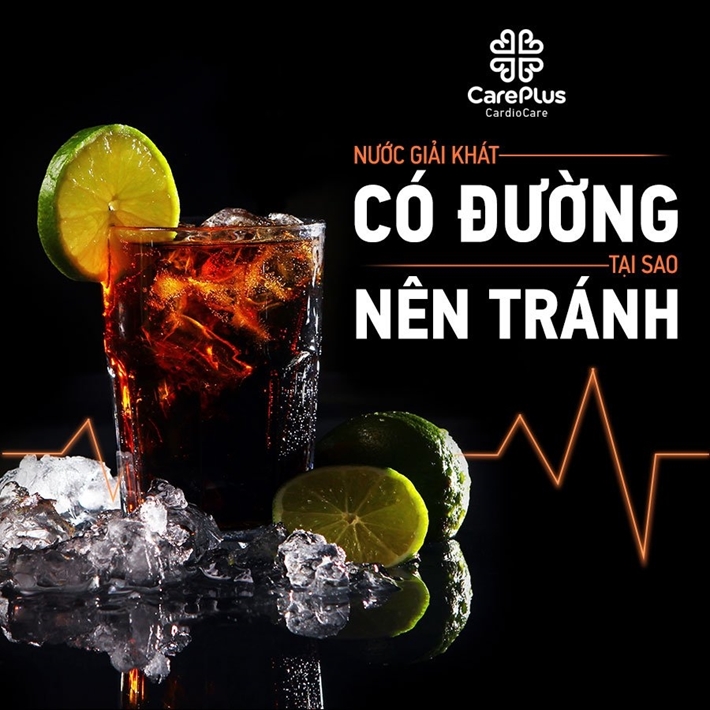Sugary drinks - why should you avoid?
Sugar-sweetened beverages include many types, such as carbonated soft drinks, fruit juices, milk teas, bottled green teas, energy drinks, etc. Heavy use of these drinks increases the risk of diabetes by up 26% compared to non-users.

6/22/2021 4:30:22 PM
Look at the data on severe cases and deaths in the US and Europe over the past year: covid has focused on hitting hard, wreaking havoc, causing severe complications for people with pre-existing cardio-metabolic problems [ie. Obesity, diabetes, blood pressure, which leads to atherosclerosis and cardiovascular disease].
The cardio-metabolic disease has its roots in a productivity-driven lifestyle, with food and a diet that provides plenty and fast [energy] for the human-machine to run, which ignores the necessary [materials] of the human body.
Such a diet harms the body's regular metabolism, gradually leading to obesity, high blood sugar, high blood cholesterol, high blood pressure, and cardiovascular disease. Sugar and sugar added drinks such as soft drinks, energy drinks, bottled fruit juices, and milk tea.
You work tired, drink a cup of milk, tea, or a bottle of coke to feel good right away. It's because [the energy] due to the amount of sugar in that water bottle is too large, helping your brain immediately run at max speed. But it's also bad for your body at the same time.
A bottle of soft drink contains about 9-10 teaspoons of sugar. A cup of pearl milk tea contains about 18-19 teaspoons of sugar. Think of this amount of sugar!
Sugar-sweetened beverages include many types, such as carbonated soft drinks, fruit juices, milk teas, bottled green teas, energy drinks, etc. Heavy use of these drinks increases the risk of diabetes. Up 26% compared to non-users.
So why should you avoid these drinks?
1️. The amount of sugar in soft drinks is often not as visible as in food, and you can easily consume large amounts quickly.
Imagine you sit and eat ten teaspoons of sugar at a time. It doesn't sound attractive at all. But if with those ten tablespoons of sugar, add in water, CO2, flavorings, caffeine, a few secret recipes, we will have an attractive can of beverage that can be drunk quickly. But many people do not expect that ten tablespoons of sugar are also the maximum amount of sugar that should use in the whole diet in 1 day. And when you drink a cup of milk tea (not counting the pearls), the amount consumed will be about 18 tablespoons of sugar!
2️. Sugary soft drinks provide only sugar and energy (calories). In addition, almost no nutrients.
This is taboo for people who are losing weight because the goal of weight loss is to provide just enough energy for the body to remain stable but must be lower than the amount of energy consumed. Soft drinks only make you recharge quickly and efficiently but do not provide protein and fiber, so you have to eat more not to feel hungry. As a result, the energy consumed is always more than the energy needed, leading to weight gain.
Sugary soft drinks are a common source of sugary foods in the Asian diet.
When doctors advise reducing carbohydrates, patients often think of eating less rice first. It is true because rice is the primary source of starch in Asians. However, sugary drinks are also significant sources of sugar to cut down. Sugary drinks make up a third of daily sugar intake in Asian countries and provide no beneficial nutrition. Therefore, sugary drinks should be the first target in the diet change process.
If switching to sugar-free, "zero calories" soft drinks, is there any benefit?
These drinks will replace sugar with artificial sweeteners like Aspartame. Research on groups using this drink showed that the risk of obesity, cardiovascular disease, and diabetes did not decrease and even increased in some long-term studies. It can say that these drinks do not help change eating habits in a healthier direction. The words "diet" or "zero calories" on the product label do not mean that you are following the diet healthy or reducing calories. It only helps create an unrealistic sense of self-assurance. It's also important to note that currently, science is continuing to understand the long-term harms of these artificial sweeteners.
In short, drinking sugary drinks can quench our thirst for a while, but we are quickly taking in more than the recommended amount of sugar in an entire day. It does not provide any beneficial nutrition, we still have to eat other foods, so it is easy to gain weight because of excess calories. Pure water is still the drink recommended by doctors at every table.